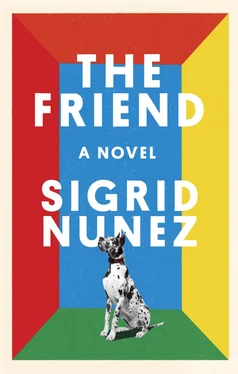What if she hadn’t stopped writing fiction herself, I asked. Did she think she would still have lost interest in reading it?
I don’t know, she said. I just know I’m much happier doing what I’m doing now than I would ever be doing what you’re doing.
• • •
Maybe it was a compliment that she felt she could say all this to me without worrying about hurting my feelings.
• • •
The student who graduates from a writing program and goes on to . . . renounce writing. You and I were familiar with the type. There seemed to be one in every class, and we always wondered: Why was it so often the one with the most promise? (Exactly the case of Wife One.)
• • •
Write about an object. Write about something that is, or was, important to you. The object can be anything. Describe the object, then write about why it’s important to you.
One woman wrote about cigarettes. Her best friend, she called them. She’d started smoking when she was eight. I would never have survived my life without them, she said. I would rather smoke than do just about anything. Another woman wrote about a knife she had used to defend herself. She was not the only one to write about some kind of weapon. But about half the women wrote about a doll. All but one of the dolls came to a bad end. They were lost or broken or in one way or another destroyed. The one doll to escape such a fate was now hidden away in a secret place from where the writer hoped someday to retrieve her. That was all the woman would say. She shook her head when I reminded her that she was supposed to describe the object. If she did that she might draw down evil, she said. The doll would come to harm, she would never see it again.
• • •
Week after week, reading the women’s stories on the bus ride home, they began to seem like one big story, like the same story told over and over. Someone is always being beaten, someone is always in pain. Someone is always being treated like a slave. A thing.
Some of the suffering are:
The same nouns: knife, belt, rope, bottle, fist, scar, bruise, blood. The same verbs: force, beat, whip, burn, choke, starve, scream.
Write a fairy tale. For some, a chance to fantasize revenge. Again, always a tale of violence and humiliation. Always the same vocabulary.
No writing is ever wasted, you used to say. Even if something doesn’t work out and you end up throwing it away, as a writer you always learn something.
Here is what I learned: Simone Weil was right. Imaginary evil is romantic and varied; real evil is gloomy, monotonous, barren, boring.
• • •
This was the last thing you and I talked about while you were still alive. After, only your email with a list of books you thought might be helpful to me in my research. And, because it was the season, best wishes for the new year.
It sounded so unlikely: a memoir about a love affair between a man and a dog.
The man: J. R. Ackerley (1896–1967), British author and literary editor of the BBC magazine The Listener.
The dog: Queenie, a German shepherd. Acquired at the age of eighteen months by Ackerley, at the time a middle-aged bachelor with a formidable history of sexual promiscuity who’d given up hope of ever finding a partner.
The book: My Dog Tulip . The change of name suggested by an editor who saw a problem with “Queenie” because Ackerley was known to be gay.
Naturally, it was from you that I first heard about Ackerley. A volume of his letters had just been published. Well worth reading, you said, like everything he wrote. But it was his memoirs that you called indispensable.
Find the right tone and you can write about anything: I was reminded often of this dictum while reading the book. “More than you want to know about what goes in or comes out of a dog’s vagina, bladder and anus,” warns one customer review. In fact, most of My Dog Tulip is about what Ackerley calls her heats. Though at times the reader can’t help feeling it’s inevitable and so might as well brace for it, no act of bestiality occurs. But to say the relationship was not intimate would be a lie. Ackerley himself admitted that he sometimes touched a sympathetic hand to the burning vulva the frustrated dog kept thrusting at him.
Consider rereading, how risky it is, especially when the book is one that you loved. Always the chance that it won’t hold up, that you might, for whatever reason, not love it as much. When this happens, and to me it happens all the time (and more and more as I get older), the effect is so disheartening that I now open old favorites warily.
The prose style is just as fine, the wit as sharp, the story, if anything, even more compelling than I remembered. But something has changed. The second time, I don’t find the author as likable. I find him even somewhat dislikable. His hostility toward women—had I missed that, or just forgotten it?
Women are dangerous, especially women of the working class. . . . They stop at nothing and they never let go.
True, Ackerley has little affection for humans in general. But the misogyny is clear. Women are bad because they are women.
An exception is made for Miss Canvey, the competent and compassionate vet who immediately diagnoses the cause of Tulip’s behavioral problems as a matter of the heart: She’s in love with you, that’s obvious.
As is the fact that he’s in love with her. But, obvious as this might be, I am bewildered by his treatment of her. Tulip’s behavioral problems are severe. A holy terror of a dog, badly trained, nervous and excitable to the point of hysteria, unsociable. She barks relentlessly, and she bites. Her behavior is so bad that it damages Ackerley’s relationships with people. Friends are dismayed that he won’t do more to discipline her. He blames “the disturbances of her psyche” on her first home, where she was left too much alone and sometimes beaten. But he himself often succumbs to berating and striking her, even though he knows such punishment can only confuse her.
Frustration, rage, violence (his words). The pattern seems inescapable. When Tulip has a litter, intensifying the chaos already reigning in the Ackerley household, he sometimes cuffs the pups.
Hard not to conclude that, with better training, Tulip would have been a happier dog, and Ackerley’s own life (to say nothing of his neighbors’) would have been much improved. But he is another one who balks at domination. Fixed in his head is the idea that Tulip must enjoy a full canine life. Meaning she must be allowed to hunt and eat rabbits, she must experience sex and motherhood. But, even after one litter, he can’t bring himself to have her spayed: How can I tamper with such a beautiful beast? Despite twinges of conscience, he is able to care less about the fates of the mongrel pups for which he knows he won’t find good homes. The beloved’s needs are all. Her heats not only turn both their lives upside down, they create havoc for his entire London district, given the large number of dogs that, like Tulip herself even in heat , go outdoors unleashed.
Page after page on the torments of her sexual frustration. Ackerley shares her pain, it breaks his heart. Season after season they suffer together. Still he won’t have her spayed. His descriptions of this part of Tulip’s existence are so harrowing that I wanted to scream: How can you not tamper with her?
Much as you admired the work, I recall, you were repulsed by the life. A life in which a person’s most significant relationship is with a dog—what could be sadder, you said. But, to me, it seemed that Ackerley had experienced to the fullest the kind of mutual unconditional love that everyone craves but most people never know. (How many have found their Tulip? asks Auden.) A fifteen-year marriage, the happiest years of his life, Ackerley said. And when the agonies of her last illness forced him to have her destroyed: I would have immolated myself as a suttee. Instead he carried on. He wrote, he drank. Six slow dark years. He drank and drank, and died.
Читать дальше












